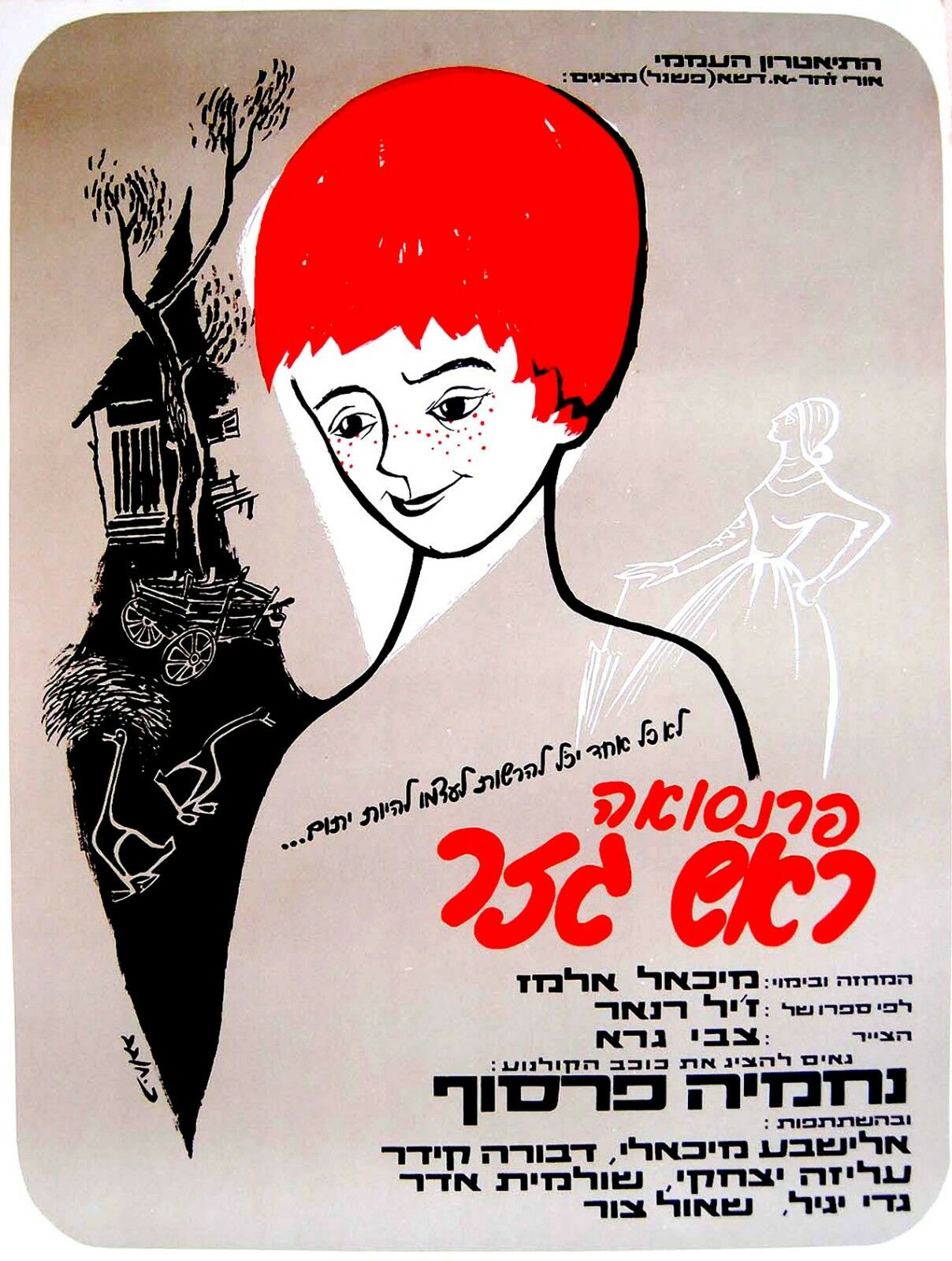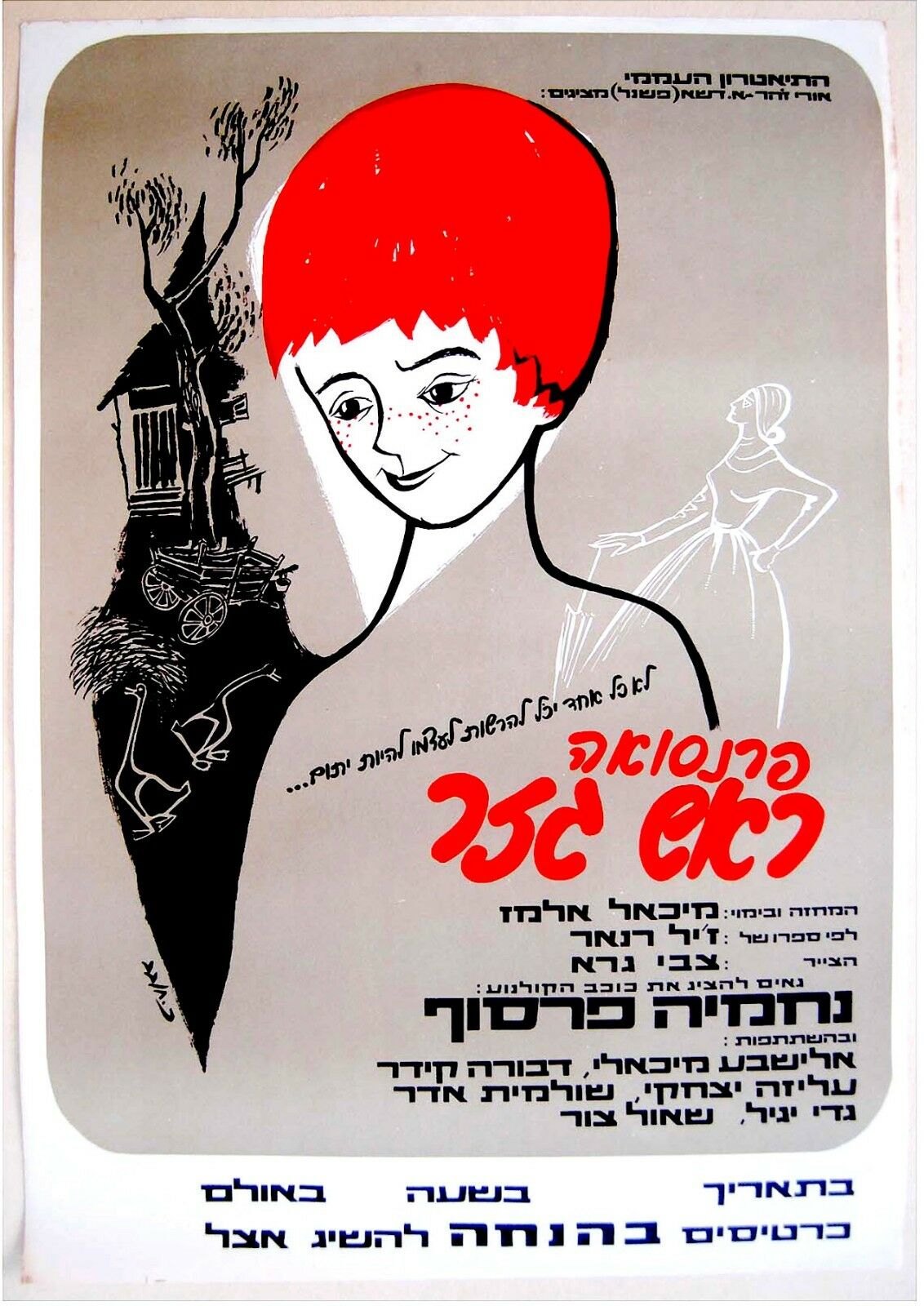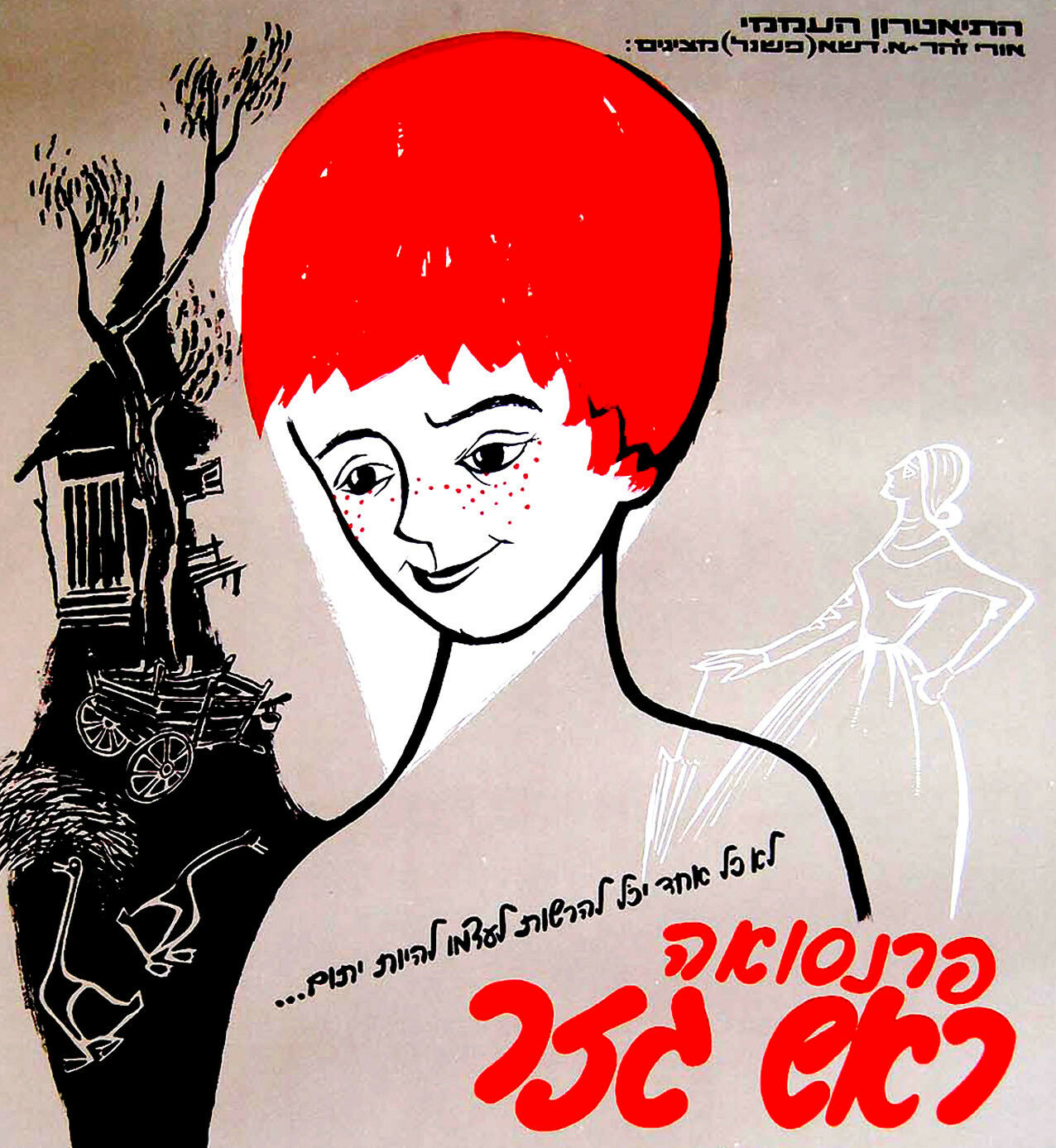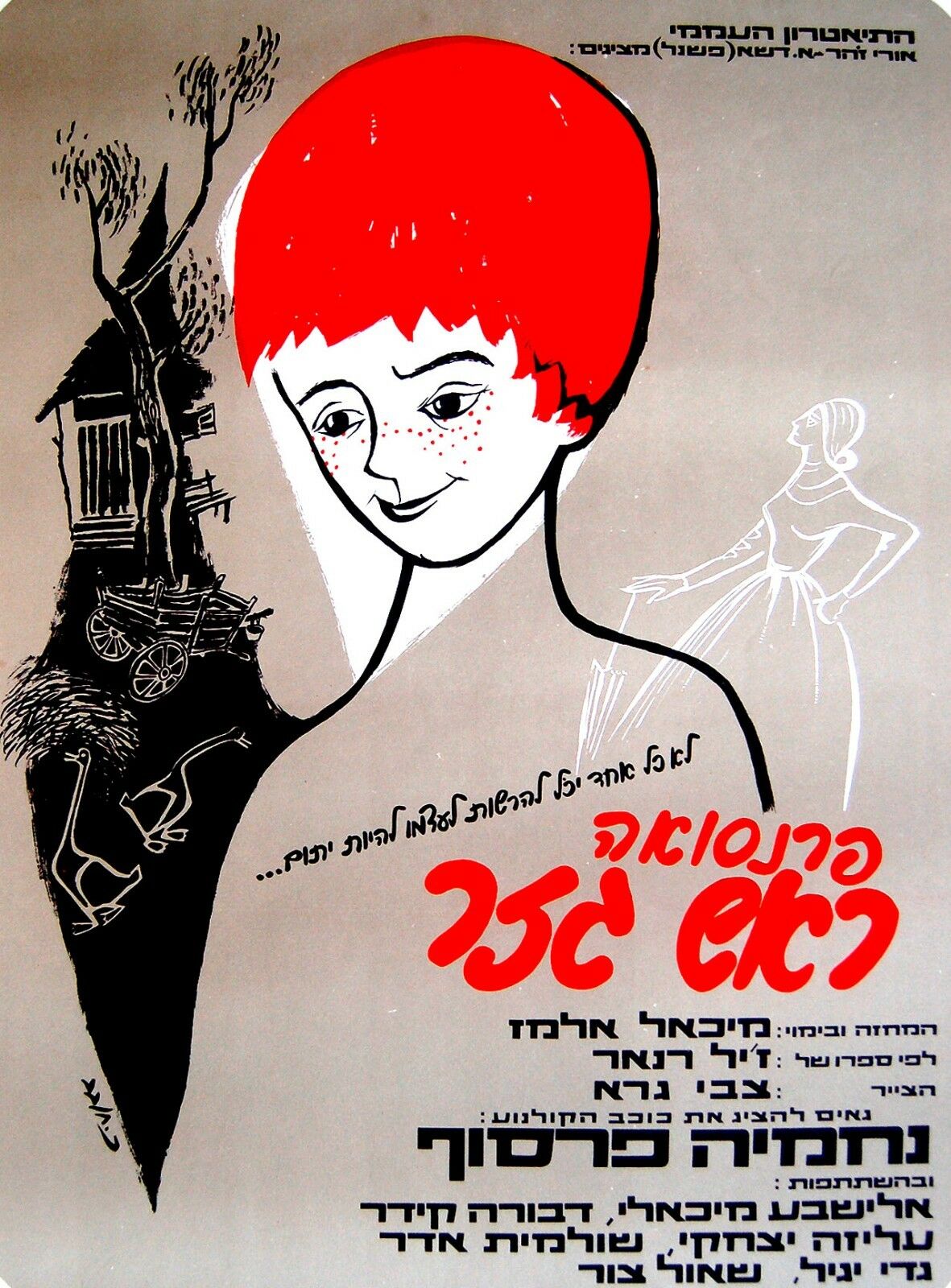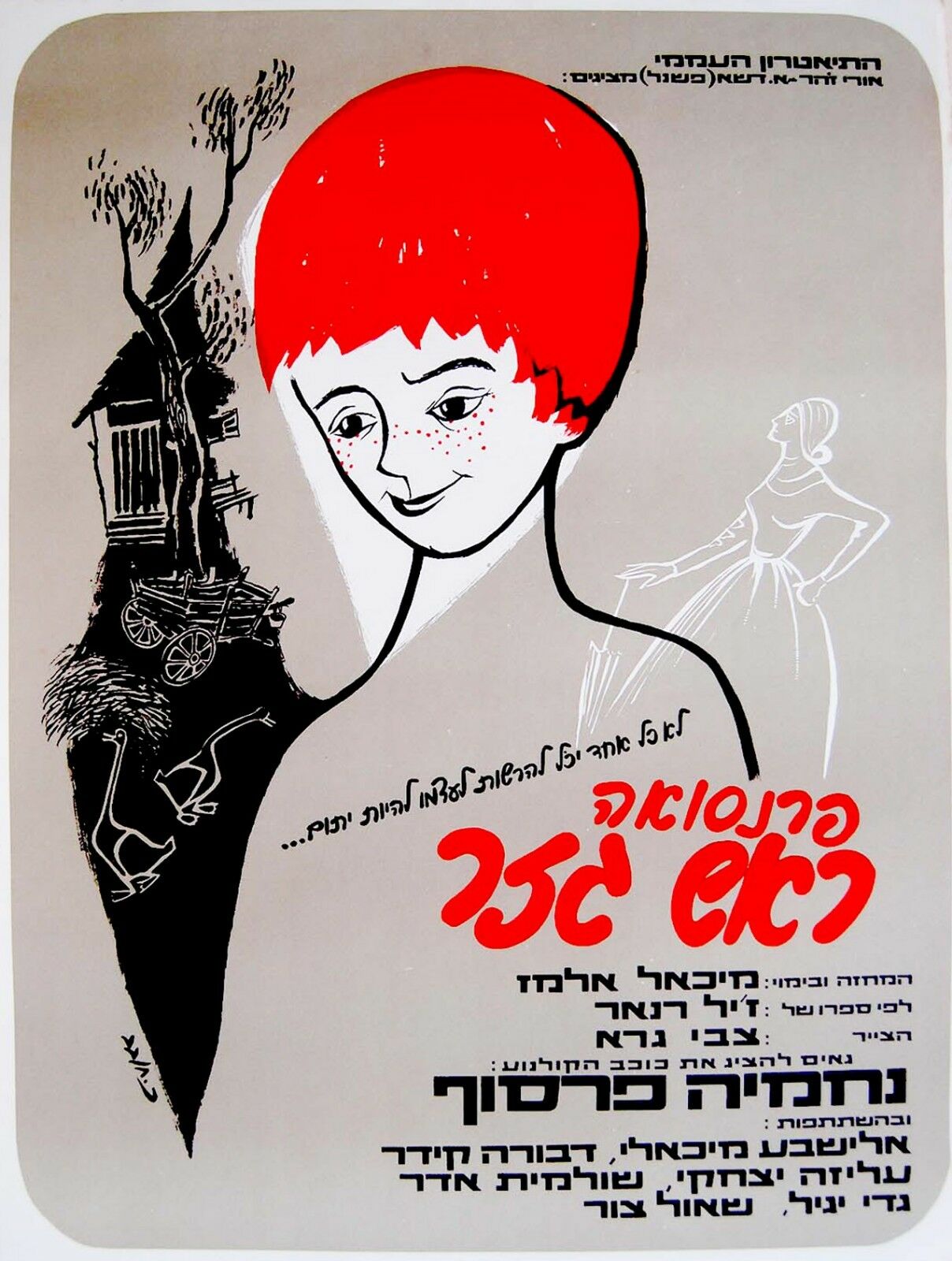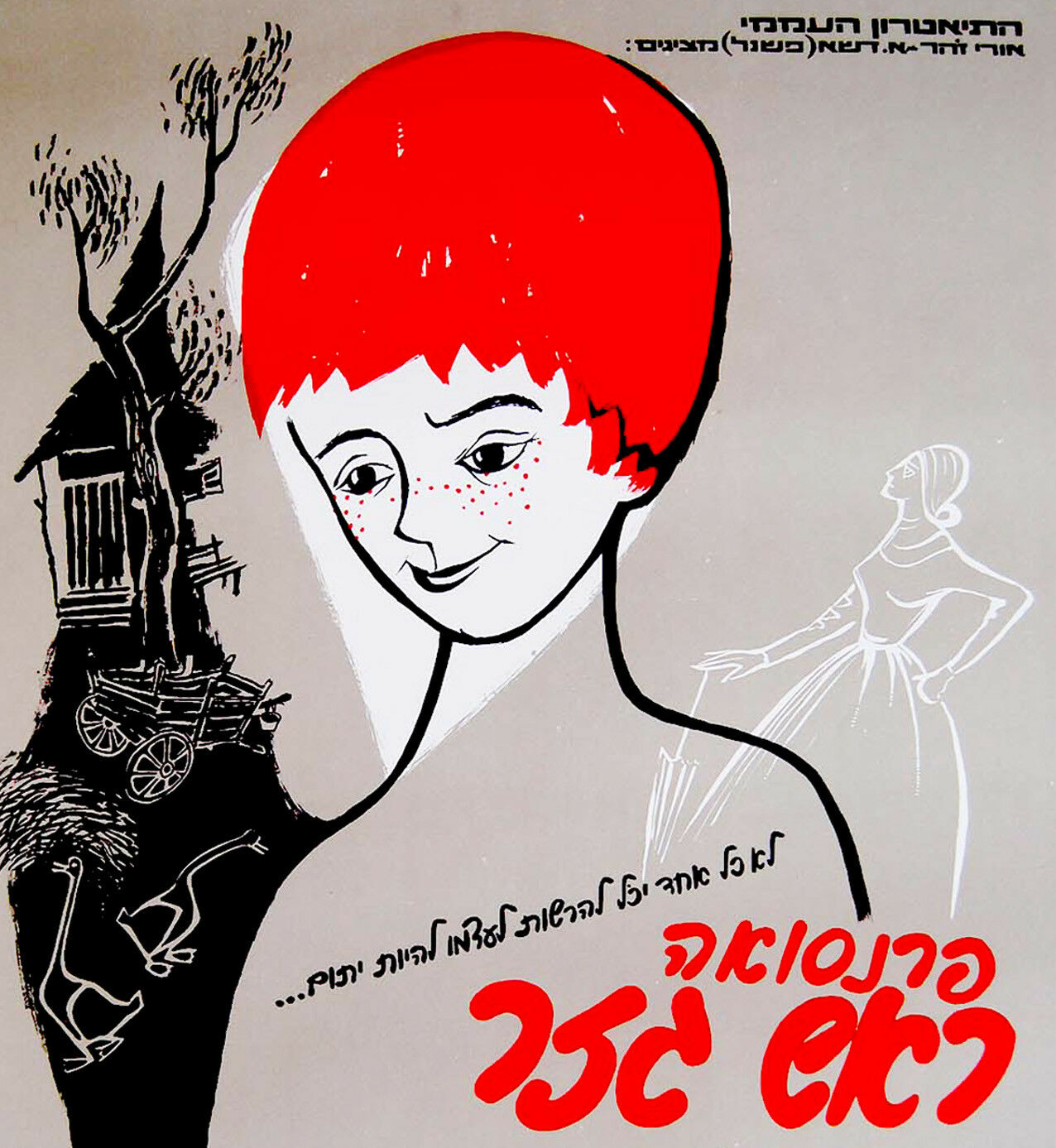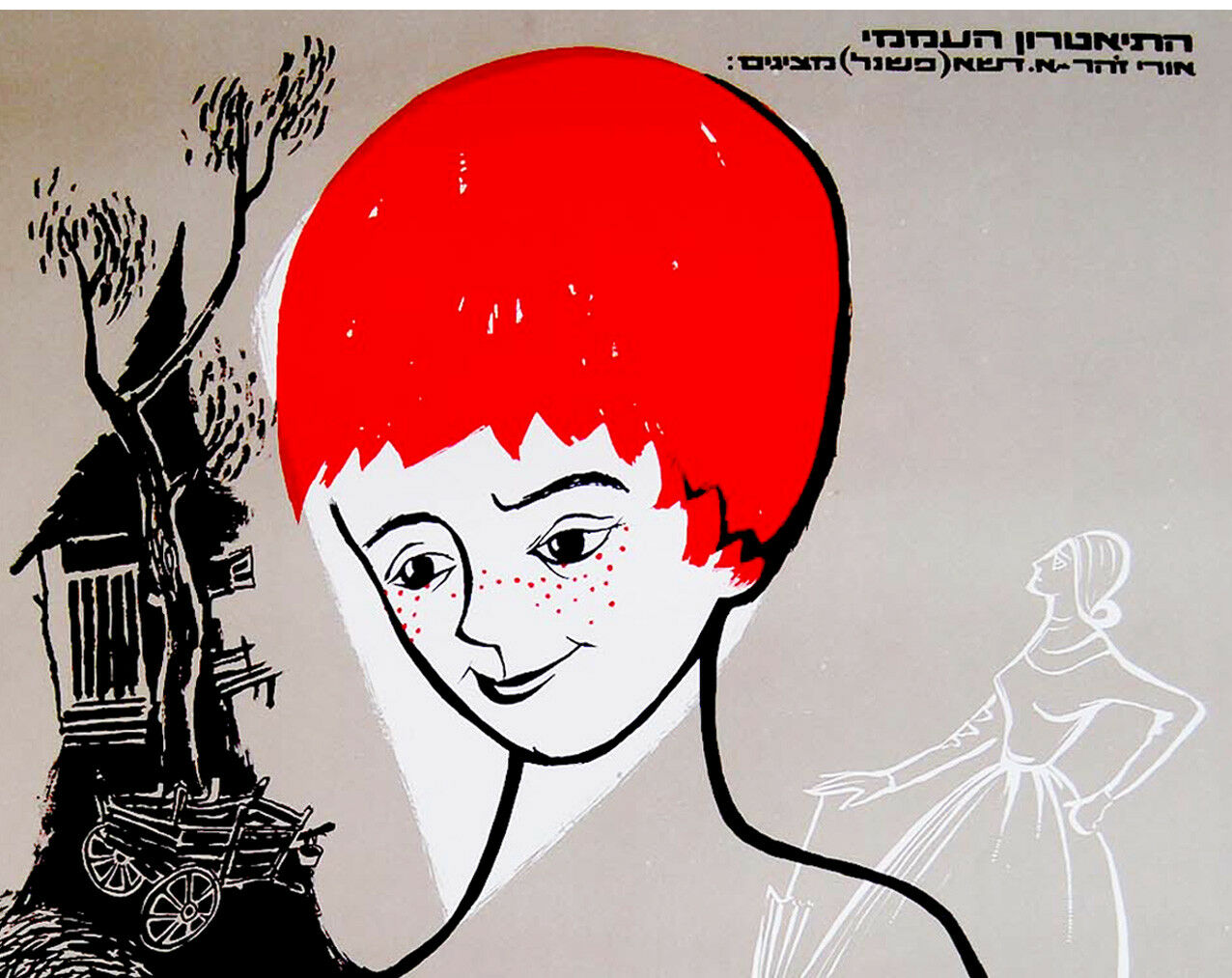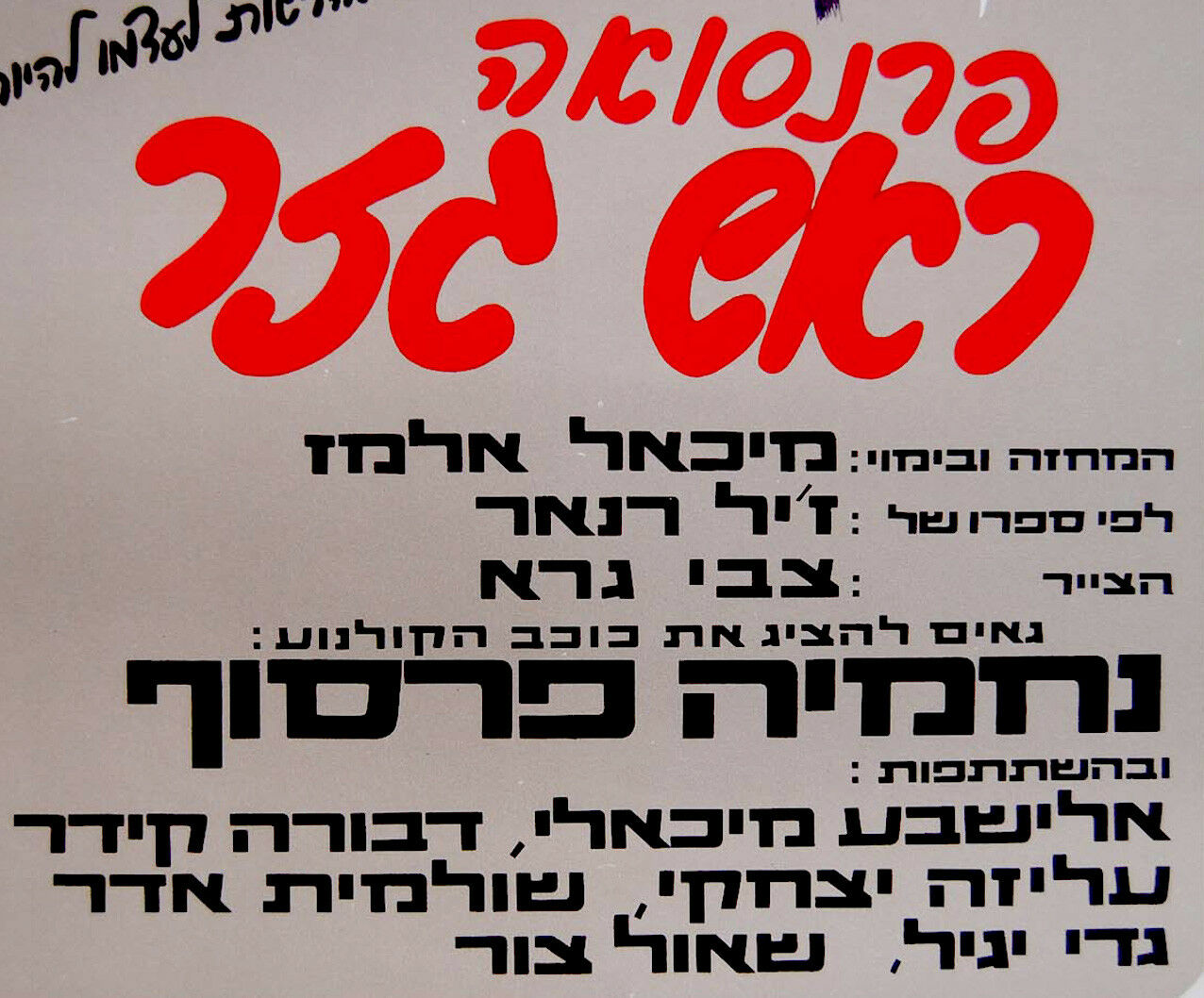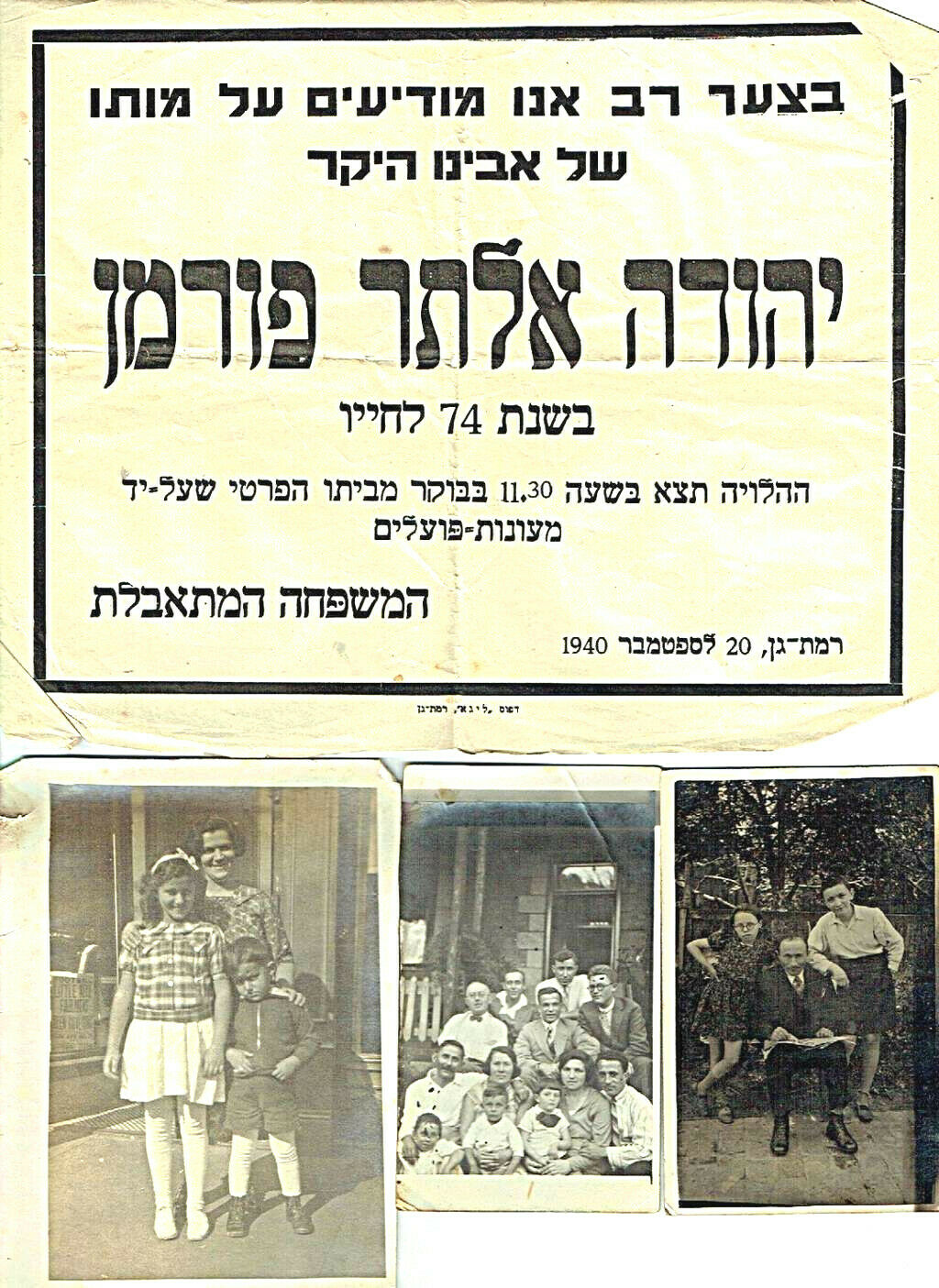-40%
1950 Israel LITHO French RARE THEATRE POSTER Hebrew CARROT HEAD POIL DE CARROTE
$ 34.32
- Description
- Size Guide
Description
DESCRIPTION:
Here for sale is a VERY RARE and ILLUSTRATED Jewish Hebrew Judaica ADVERTISING French THEATRE POSTER which was beautifuly DESIGNED , Published and distributed around 60 years ago in the 1950’s ISRAEL . The poster advertise the Hebrew speaking version of the French play
“ POIL DE CARROTE “ ( CARROT HEAD ) based on the book by JULES RENARD . The ILLUSTRATED poster was printed in LITHOGRAPHIC PRINTING . A few quite legendary Israeli names were involved in that historical production : The Jewish – American actor Nehemiah Persoff , The legendary Israeli director Uri Zohar , The legendary producer Avraham Deshe Pashanel , The director Michael Almaz and other famous Israeli actors. The beautifuly designed poster was created by Chovav . Hebrew. Around 20 x 14 " . Heavy stock. Excellent condition. Clean. ( Pls look at scan for accurate AS IS images ) Will be sent roled inside a protective sealed rigid TUBE .
AUTHENTICITY
:
The poster is fully guaranteed ORIGINAL from the 1950's , It is NOT a reproduction or a recently made reprint or an immitation , It holds a life long GUARANTEE for its AUTHENTICITY and ORIGINALITY.
PAYMENTS
:
Payment method accepted : Paypal .
SHIPPING
:
Shipp worldwide via registered airmail is $ 25 .W
ill be sent in a special protective rigid sealed package.
Will be sent around 5 days after payment .
Poil de carotte (Carrot Head) is a long short story or autobiographical novel by Jules Renard published in 1894, which recounts the childhood and the trials of a redheaded child. It is probably in this miserable childhood story where one should look for the origins of Renard's skepticism and irony, his skill in using litotes, his dense and precise style, and his harsh method of observation. The story unfolds in a series of short sketches. The story of "Poil de carotte" is that of an unloved redheaded child, the victim of a cruel family. François Lepic, nicknamed Poil de carotte, grows up with a mother who hates him and a father who is indifferent to him. The reader follows the journey of this young boy, the relationships with his parents, with the world around him and with nature. Poil de carotte uses cunning to battle the daily humiliations he experiences and to stand up to the adult world. So, tragedy notwithstanding, the reader enjoys delightful, amusing, comical, and moving adventures. Adaptations The author adapted the story for the stage in 1900 with André Antoine. In 1903, Charles Frohman produced an English-language version called Carrots with Ethel Barrymore playing François.] Julien Duvivier adapted it for the screen in 1926 and in 1932 Paul Mesnier adapted it for the screen in 1952. Henri Graziani adapted it for the screen in 1972, starring Philippe Noiret and Monique Chaumette. Richard Bohringer adapted it for television in 2003. An animated cartoon was made in 1997 and broadcast on France 5. A theater play in Walloon, named "Tiesse di keuve" (copper head) was written by Émile-Henri Genon, and video-recorded in 1999 by "Médiathèque de la Province de Liège". Pierre-Jules Renard or Jules Renard (February 22, 1864 – May 22, 1910) was a French author and member of the Académie Goncourt, most famous for the works Poil de carotte (Carrot Top) (1894) and Les Histoires Naturelles (Nature Stories) (1896). Among his other works are Le Plaisir de rompre (The Pleasure of Breaking) (1898) and Huit jours à la campagne (A Week in the Country) (1906). Poil de carotte est une longue nouvelle ou un roman autobiographique de Jules Renard publiée en 1894, qui raconte l'enfance et les déboires d'un garçon roux mal aimé. Résumé Poil de carotte est un enfant très mal aimé, qui, pour lutter contre les humiliations quotidiennes et la haine maternelle, n'a que la ruse, cette arme des faibles. Sans doute est-ce dans cette enfance malheureuse qu'il faut chercher les sources du scepticisme et de l'ironie de Jules Renard (1864-1910), son art de la litote, son style dense et précis, sa cruauté d'observation. Le récit se présente comme une suite de courts croquis formant des chapitres. François Lepic, surnommé « Poil de carotte » à cause de ses cheveux roux et ses taches de rousseur, est montré comme victime des humiliations et de l'indifférence de ses parents, de son frère Félix et de sa sœur, Ernestine. Il est lui-même bourreau, lorsqu'il massacre de petits animaux... Autres résumés La célèbre histoire de Poil de Carotte est celle d'un enfant roux mal aimé, victime d'une famille cruelle. François Lepic, de son vrai nom, grandit entre une mère qui le hait et un père indifférent. On suit le parcours de ce jeune garçon, sa relation avec ses parents, avec le monde qui l'entoure et avec la nature. Poil de Carotte utilise la ruse pour lutter contre les humiliations du quotidien et braver le monde des adultes. Ainsi, malgré le drame, on savoure de délicieuses aventures, drôles, cocasses, émouvantes, souvent traitées avec l'ironie si bien maîtrisée par l'écrivain Poil de Carotte a beau se taillader les joues pour qu'elles rosissent, personne ne l'embrasse. Mme Lepic n'aime pas son petit dernier aux cheveux roux. « Tout le monde ne peut pas êtrese répète Poil de Carotte, et il nous livre ses idées personnelles, «ainsi nommées parce qu'il faut les garder pour soi. Ni la générosité ni la sincérité ne paient dans le monde des adultes. Il faut ruser. L'existence de Poil de Carotte est un enfer dont il ne s'échappe que par une cruelle lucidité. Début du roman Qui se souvient encore de ce nom « Poil de carotte », ainsi appelle-t-on depuis toujours le petit dernier de la famille Lepic. Tout simplement à cause de ses cheveux roux et ses taches de rousseur. Poil de carotte n'a peur de rien, ce qui ne l'empêche pas de trembler dans le noir en entendant la voix de sa mère, sa mère qui le punit toujours injustement et lui préfère son grand frère Félix et sa sœur Ernestine. Et pourtant Poil de carotte est plein de tendresse mais, ne sachant l'exprimer il se montre souvent maladroit et sot... Chapitre 1 (« Les poules ») : Poil de carotte a peur d'aller fermer la porte du poulailler, mais il est obligé par sa mère, elle sait très bien qu'il a peur d'y aller, après s'y être rendu, sa mère lui dit : « Tu iras les fermer tous les soirs. » Et dire que Poil de carotte attendait au moins un geste de sympathie mais rien. Chapitre 2 (« Les perdrix ») : Toute la famille a une tâche quand M. Lepic ramène les perdrix à la maison. Poil de carotte doit les tuer, mais il n'aime pas le faire mais sa mère ne l'écoute pas et lui répond toujours que ce n'est pas des choses pour lui, soit qu'il est trop petit. Chapitre 3 (« C'est le chien ») : Tout le monde [la famille] est dans le salon, et est occupé, Poil de carotte lui par terre se rappelle des choses, Pyrame, le chien pousse un grognement, ils lui disent de se taire, mais il grogne encore plus fort, et toute la famille sursaute, Madame Lepic lui donne des claques et monsieur Lepic le frappe avec son journal, Poil de carotte va voir ce qui se passe, il voit par la porte un chemineau, après il rentre, chacun était calmé et avait repris sa place, Poil de carotte dit tout de même : « C'est le chien qui rêvait ». Adaptations L'auteur l'adapta avec Antoine pour le théâtre en 1900 sous le même titre : Poil de carotte. Julien Duvivir l'adapte au cinéma en 1926 et en 1932 : Poil de carotte (1926). Poil de carotte (193). Une autre adaptation Poil de carotte (1952) réalisée par Paul Mesnier. Un téléfilm de Richard Bohringer en a été tiré en 2003. Un dessin animé Poil de Carotte a été réalisé en 1997 et diffusé l'été dans l'émission Midi les Zouzous sur France 5. Une bande-dessinée Poil de Carotte de Luc Duthil & Céline Riffard a été publiée en 2010 That's What I Am est un film réalisé par Michael Pavone Nehemiah Persoff (born August 2, 1919) is an American actor. Born in Jerusalem, Palestine Mandate (now part of Israel), Persoff emigrated with his family to the United States in 1929. After serving in the Army during World War II, he worked as a subway electrician doing signal maintenance while he began to pursue his acting career in the New York Theater. In 1947, he was accepted into the Actors Studio and eventually began his acting career in 1948. His first notable role was as "Little Bonaparte" in Some Like It Hot (he is the last survivor of the credited cast). He starred in supporting roles in films like The Greatest Story Ever Told and - a bit bigger - in The Comancheros. In the film Yent Persoff portrayed Barbra Streisand's character's father, also the 1988 film Twins and the American Tail (animated-film series) as Papa Mousekewitz. His television credits include Five Fingers ("The Moment of Truth"), The Big Valley ("Legend of a General", Parts I & II, episode), Alfred Hitchcock Presents ("Heart of Gold" episode), The Untouchables, Naked City, The Legend of Jesse James, Gunsmoke, The Wild Wild West, Hawaii Five-O, Ellery Queen ("The Adventure of the Pharaoh's Curse" episode), Mission: Impossible (3 episodes), Adam-12 ("Vendetta" episode), Charlie's Angels, Hunter Columbo, Star Trek: The Next Generation, Magnum, P.I. Law & Order I Spy, It Takes A Thief, Chicago Hope and MacGyver. In the mid-1980s, when health problems decreased his acting workload, Persoff pursued painting, specializing in watercolor. He retired from acting and is devoted full-time to his painting. Uri Zohar (Hebrew: אורי זוהר, b. November 4 1935) is a former Israeli film director, actor, and comedian who left the entertainment world to become a rabbi.Uri Zohar was born in Tel Aviv in November 4 1935. In 1952, he graduated high school and did his military service in an army entertainment troupe. His first marriage ended in divorce.By 1956, he was a popular stand-up comedian. In 1960, he studied philosophy at the Hebrew University of Jerusalem. He was sentenced to three months of community service on charges of marijuana possession. In the 1960s, he directed and starred in Israeli films, among them Hole in the Moon, Three Days and a Child, Every Bastard a King, Big Eyes and Metzitzim. He was the first filmmaker to win the Israel Prize, which he declined.In the late 1970s, Zohar turned to religion, becoming a Haredi Orthodox Jew and a rabbi. In 1977, he began wearing a kippa on the television game show he was hosting. He is active in the movement to attract secular Jews to religious orthodoxy, and uses his entertainment skills to promote this objective. In the 1992 Israeli elections, Zohar directed the television broadcasts for Shas.In 2005, he was voted the 48th-greatest Israeli of all time, in a poll by the Israeli news website Ynet to determine whom the general public considered the 200 Greatest Israelis.[Awards and recognitionIn 2012, Cinematheque Francaise in Paris held a retrospective of Zohar's work. The event included lectures and screenings of all his major films. Zohar was described as one of Israel's most interesting film directors due to his exploration of manhood and machismo, male-female relationships and the impact of the military. Michael Almaz was born in Tel Aviv and studied theatre in New York. In Tel Aviv he founded the troupe Zira (Arena), doing experimental and controversial work as director and writer including the play Across the Border dealing with Palestinian refugees. He moved to London in the early 1960s where he worked with the BBC World Service. His large-scale satirical shows Every Number Wins appeared at the Little Theatre, 1965 while The Rasputin Show, performed by Brighton Combination, 1968 was a major success. He continued to write plays including a series on 19th century revolutionaries, called The Anarchist Collection, several of them produced at the Pool Theatre, Edinburgh for which he also wrote a string of Lunchtime plays. In 1974 he founded the Artaud Theatre Company, named after the success of the one-man show Monsieur Artaud, written by Almaz. He then met Sally Willis who became his principal performer, for whom he wrote a series of one-woman shows, which toured all over Europe, starting with Memoirs of a Witch (1974), followed by Letters from K (1974), about Franz Kafka’s long-suffering fiancée, Story (1974) and Masoch (1975), about Wanda von Sacher Masoch, wife of the first ‘masochist’. Meanwhile Almaz, with his wife Pam Martell, set up the London Cafe Theatre in Leicester Square in 1974, where Intimacy, based on a story by Jean Paul Sartre became the longest running play on the London fringe, while Underground Man, (adapted from Dostoevsky) and Dialogue with a Dying Man (from De Sade), also had extensive runs. Michael died on Tuesday, 16th October 2012. ebay1977
